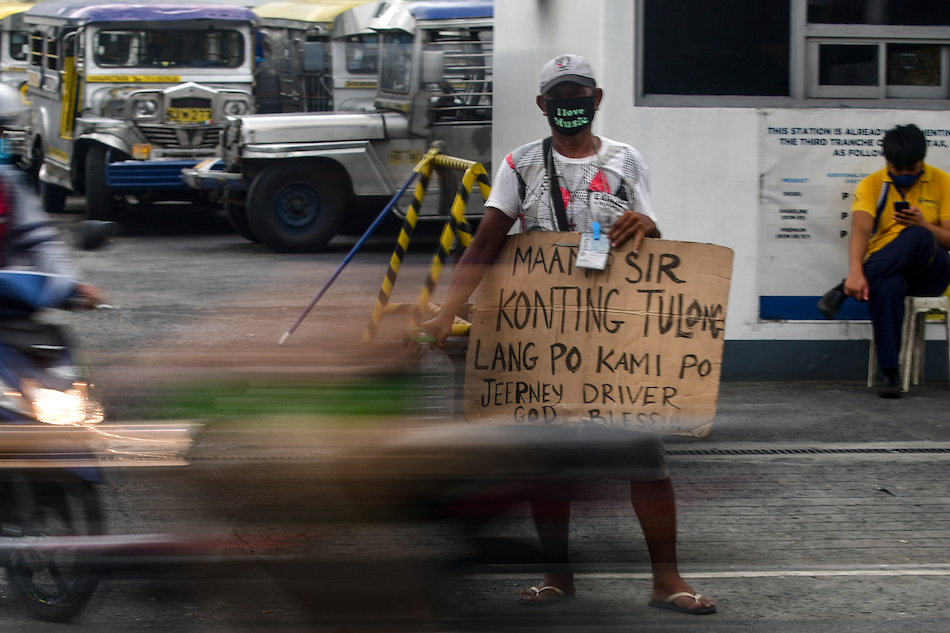Economy seen held back by ‘excessive risk aversion' as PH posts worst contraction | ABS-CBN

Welcome, Kapamilya! We use cookies to improve your browsing experience. Continuing to use this site means you agree to our use of cookies. Tell me more!
Economy seen held back by ‘excessive risk aversion' as PH posts worst contraction
Economy seen held back by ‘excessive risk aversion' as PH posts worst contraction
ABS-CBN News
Published Jan 28, 2021 05:31 PM PHT
MANILA - After the Philippine economy posted its worst post-war contraction, economic managers on Thursday said the economy was weighed down by lockdowns and that “prolonging the status quo of community quarantine and risk aversion is not an option.”
MANILA - After the Philippine economy posted its worst post-war contraction, economic managers on Thursday said the economy was weighed down by lockdowns and that “prolonging the status quo of community quarantine and risk aversion is not an option.”
In a statement delivered by Socioeconomic Planning Secretary Karl Chua, the Duterte administration’s economic managers said “the economy is strong enough to recover if we enable it to do so.”
In a statement delivered by Socioeconomic Planning Secretary Karl Chua, the Duterte administration’s economic managers said “the economy is strong enough to recover if we enable it to do so.”
“In 2020, we saw significant hardships among the people who were deprived of jobs and income that led to more hunger, more poor people, higher prevalence of other sicknesses, far more deaths from non-COVID reasons, and lost opportunities,” Chua said.
“In 2020, we saw significant hardships among the people who were deprived of jobs and income that led to more hunger, more poor people, higher prevalence of other sicknesses, far more deaths from non-COVID reasons, and lost opportunities,” Chua said.
Quarantine restrictions reduced household spending by P801 billion in 2020 or an average of around P2.2 billion per day, Chua said.
Quarantine restrictions reduced household spending by P801 billion in 2020 or an average of around P2.2 billion per day, Chua said.
ADVERTISEMENT
The fall in consumption translates into a total income loss of around P1.04 trillion in 2020 or an average of around P2.8 billion per day, he added.
The fall in consumption translates into a total income loss of around P1.04 trillion in 2020 or an average of around P2.8 billion per day, he added.
Chua pointed out that private consumption, which comprises some 70 percent of GDP, remained weak as restrictions on the mobility of children, and hence families, prevented private consumption from making a stronger comeback.
Chua pointed out that private consumption, which comprises some 70 percent of GDP, remained weak as restrictions on the mobility of children, and hence families, prevented private consumption from making a stronger comeback.
“Economic growth will be hard pressed to make a stronger recovery if children and families are restricted from participating in the economy, as up to 50 percent of non-essential retail sales are driven by family spending.”
“Economic growth will be hard pressed to make a stronger recovery if children and families are restricted from participating in the economy, as up to 50 percent of non-essential retail sales are driven by family spending.”
Last week, the inter-agency task force leading the country’s pandemic response announced that minors aged 10 to 14 would be allowed to go out of their homes in areas under modified general community quarantine or MGCQ.
Last week, the inter-agency task force leading the country’s pandemic response announced that minors aged 10 to 14 would be allowed to go out of their homes in areas under modified general community quarantine or MGCQ.
President Rodrigo Duterte however took this back a few days later saying he was compelled to reimpose the restrictions on minors due to the detection of the new COVID-19 variant in upland northern Luzon.
President Rodrigo Duterte however took this back a few days later saying he was compelled to reimpose the restrictions on minors due to the detection of the new COVID-19 variant in upland northern Luzon.
Chua meanwhile acknowledged that easing quarantine restrictions have been complicated by the emergence of new COVID-19 variants, but said economic managers expect the government will have rolled out enough vaccines against COVID-19 for a majority of Filipinos before the end of 2021.
Chua meanwhile acknowledged that easing quarantine restrictions have been complicated by the emergence of new COVID-19 variants, but said economic managers expect the government will have rolled out enough vaccines against COVID-19 for a majority of Filipinos before the end of 2021.
Economic managers expect GDP to grow by 6.5 to 7.5 percent in 2021 and by 8 to 10 percent in 2022.
Economic managers expect GDP to grow by 6.5 to 7.5 percent in 2021 and by 8 to 10 percent in 2022.
Read More:
economic managers
DBCC
GDP contraction
worst post-war recession
gross domestic product
economy
Karl Chua
NEDA
PSA
ADVERTISEMENT
ADVERTISEMENT


